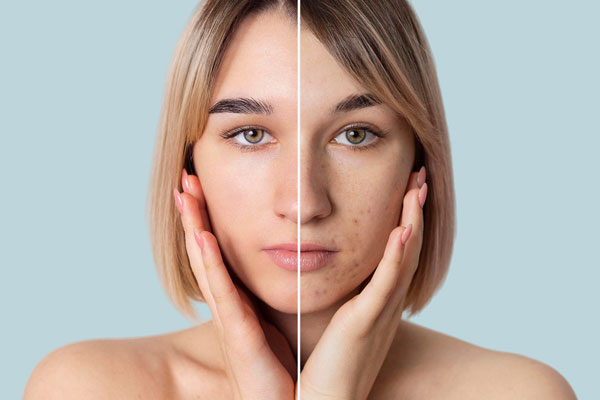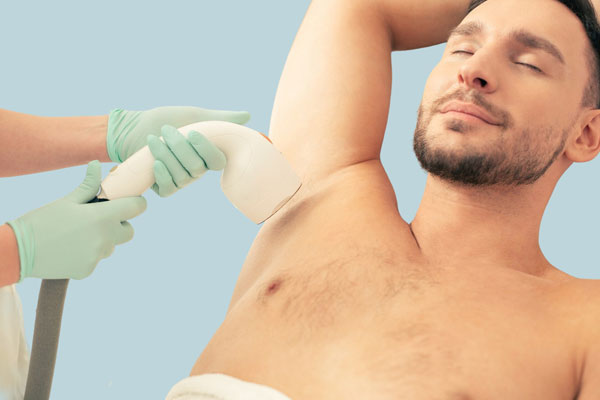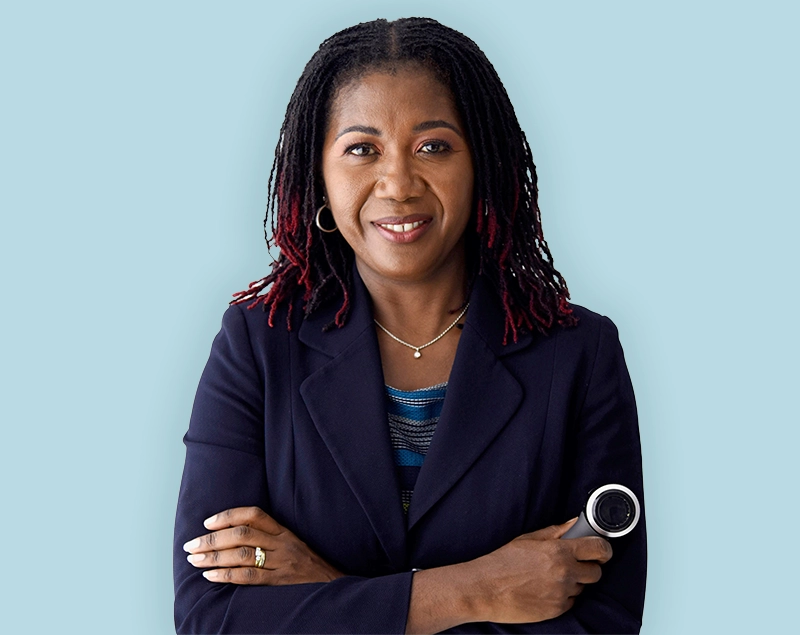Overview
What is acne?
Acne develops when pores in the skin become blocked by excess oil, dead skin cells and bacteria. This blockage leads to inflammation and the appearance of spots such as blackheads, whiteheads, papules, pustules, nodules and cysts.
Acne most commonly affects the face, chest, back and shoulders, as these areas have more oil glands. The condition can vary from mild, occasional breakouts to severe, painful cystic acne that can cause long-term scarring.
Although it is most common during puberty, acne can continue into adulthood or appear later in life due to hormonal changes, certain medications, stress or genetics.
Symptoms and Causes
How acne appears
Acne may present in different ways, including:
- Blackheads and whiteheads: Small clogged pores (comedones)
- Papules and pustules: Red or pus-filled spots
- Nodules and cysts: Large, painful lumps beneath the surface of the skin
In some cases, acne may cause dark spots or scars once the spots have healed.
What causes acne?
Acne develops due to several interacting factors:
- Excess oil production: Sebaceous glands produce too much sebum, blocking pores.
- Blocked follicles: Dead skin cells and oil clog the pores.
- Bacteria: Cutibacterium acnes bacteria trigger inflammation.
- Hormonal changes: Fluctuations during puberty, menstrual cycles, pregnancy or from hormonal contraceptives can worsen acne.
- Genetics: A family history of acne increases the likelihood of developing it.
- Lifestyle and external factors: Stress, certain foods high in refined carbohydrates, and heavy or oily cosmetics can contribute.
Diagnosis and Tests
How is acne diagnosed?
A GP or dermatologist can usually diagnose acne through a skin examination. They will look at the types of spots, their location and severity.
Tests are not usually needed, but a blood test or hormone assessment may be carried out if acne develops suddenly in adulthood, is severe or occurs alongside other symptoms such as irregular periods or excess hair growth.
If you have scarring, pigmentation or cystic acne, your GP may refer you to a dermatologist for specialist treatment.
Management and Treatment
How is acne treated?
Treatment depends on the severity of acne and how long it has been present. The aim is to reduce oil production, keep pores clear, prevent bacterial growth and limit inflammation.
Mild acne
- Topical treatments: Over-the-counter or prescribed creams containing benzoyl peroxide, salicylic acid or topical retinoids (such as adapalene) help unblock pores and reduce inflammation.
- Gentle skincare: Use non-comedogenic cleansers and moisturisers. Avoid harsh scrubs or over-washing, as this can irritate the skin.
Moderate to severe acne
- Topical antibiotics: Such as clindamycin, often combined with benzoyl peroxide or a retinoid.
- Oral antibiotics: Such as doxycycline or lymecycline, taken for a limited time to reduce bacteria and inflammation.
- Hormonal treatments: Combined oral contraceptive pills or anti-androgen medicines may help women with hormonally driven acne.
- Oral isotretinoin (Roaccutane): Highly effective for severe or scarring acne, but prescribed under specialist supervision due to potential side effects and monitoring requirements.
Procedures and additional treatments
- Chemical peels and microdermabrasion can help clear blocked pores and improve mild scarring.
- Laser and light therapy can reduce bacteria and inflammation.
- Microneedling or laser resurfacing may help with acne scars once active acne is under control.
Self-care and Aftercare
Maintain a consistent skincare routine with gentle cleansing, moisturising and daily sun protection. Avoid touching or picking spots, as this can increase inflammation and scarring.
Outlook/Prognosis
With the right treatment, most people’s acne can be controlled or cleared. Improvement usually takes time, often several weeks or months.
Mild acne may resolve on its own, while moderate to severe acne may need long-term management. Early and consistent treatment helps prevent permanent scarring and dark marks.
Even after acne improves, maintaining a simple, regular skincare routine and addressing hormonal or lifestyle triggers can help prevent flare-ups.
Prevention
You cannot always prevent acne, but you can reduce flare-ups by following these tips:
- Wash your face twice daily with a mild, non-abrasive cleanser.
- Avoid touching your face and keep phones and pillowcases clean.
- Use oil-free, non-comedogenic skincare and makeup products.
- Remove makeup before bed.
- Keep hair clean and away from your face if it tends to be oily.
- Maintain a balanced diet and stay hydrated.
- Manage stress with regular exercise or relaxation techniques.
If acne persists or causes scarring, speak to your GP or dermatologist for further treatment options.






